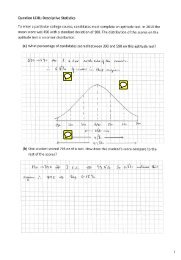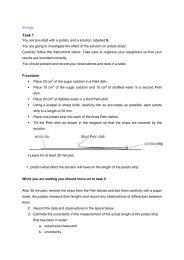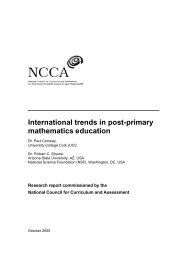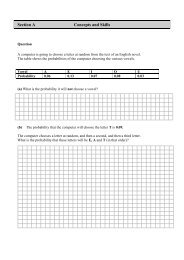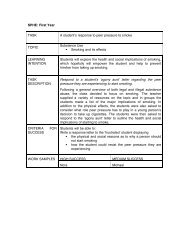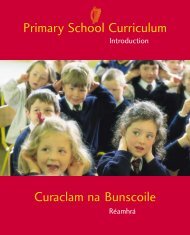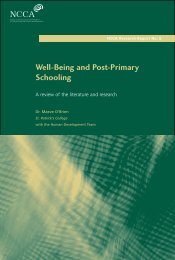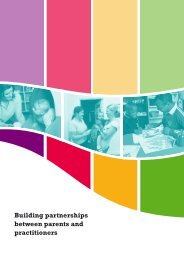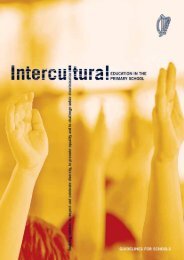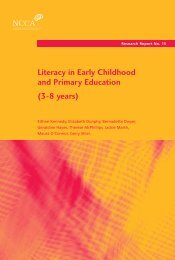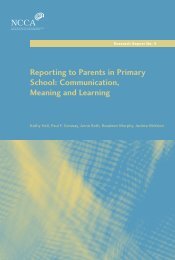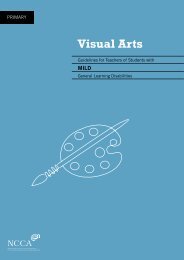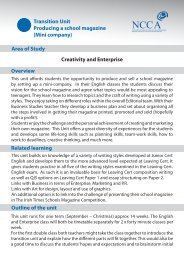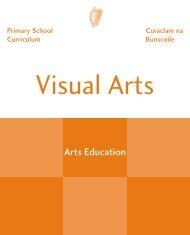Up and Away - National Council for Curriculum and Assessment
Up and Away - National Council for Curriculum and Assessment
Up and Away - National Council for Curriculum and Assessment
You also want an ePaper? Increase the reach of your titles
YUMPU automatically turns print PDFs into web optimized ePapers that Google loves.
12<br />
2. Integrating pupils<br />
The following activities, many of which are a natural part of the school day, are used to foster integration<br />
in the school.<br />
In class:<br />
Introduce newcomer pupils with a discussion<br />
about their countries.<br />
Seat newcomer pupils with native pupils.<br />
Study different cultural festivals.<br />
Do a class project on ‘Countries of the world’<br />
(including Irel<strong>and</strong>).<br />
Hold story telling sessions about schools in<br />
different countries.<br />
Introduce a buddy system <strong>for</strong> reading.<br />
Do creative movement sessions dealing with<br />
issues like exclusion, integration, assimilation,<br />
etc.<br />
Encourage pupils to play together in class<br />
groups or with board games during indoor<br />
breaks.<br />
Invite pupils to bring in party food on their<br />
birthdays.<br />
Language support teacher takes mainstream<br />
class on a regular basis <strong>and</strong> works on materials<br />
that will be followed up in language support<br />
classes.<br />
Language support teacher takes SPHE sessions<br />
in the mainstream class dealing with issues of<br />
culture, difference, what it is to feel different, etc.<br />
Language support teacher joins in art or IT<br />
classes to look at art <strong>and</strong> websites from<br />
around the world.<br />
Classroom activities:<br />
Activities based on cooperation <strong>and</strong> teamwork are<br />
also an excellent way to develop a fully-integrated<br />
group. These include familiar activities, such as:<br />
Circle time.<br />
Story time.<br />
Story writing.<br />
Drama <strong>for</strong> older pupils <strong>and</strong> plays <strong>for</strong> smaller<br />
children using class readers.<br />
Book making.<br />
Class projects on mainstream topics.<br />
Group art sessions.<br />
Cooking.<br />
Games <strong>and</strong> PE.<br />
Organise:<br />
‘International language day’ with word games,<br />
songs, poems, etc.<br />
‘World dance day’.<br />
‘Day of world culture’. Involve all pupils in the<br />
preparations.<br />
Speakers from different countries to come in <strong>and</strong><br />
talk about relevant topics.<br />
Ecumenical prayer week <strong>for</strong> children from all<br />
religious backgrounds.<br />
School tours.<br />
Sponsored walks.<br />
Also:<br />
Involve pupils in sports <strong>and</strong> other activities such as<br />
Community Games, swimming, Irish dancing,<br />
majorettes, the school choir <strong>and</strong> singing, the school<br />
b<strong>and</strong>, concerts, etc.<br />
Encourage all pupils to participate in local festivals,<br />
parades, etc.<br />
Use school assembly <strong>for</strong> the presentation of songs,<br />
drama, costumes <strong>and</strong> stories from different<br />
countries.<br />
Invite newcomer pupils to bring an English-speaking<br />
friend to language support class. Use the buddy<br />
system.<br />
Ensure that parents of newcomer pupils underst<strong>and</strong><br />
invitations to birthday parties.<br />
Use games (e.g. during break) that bring children<br />
together.



